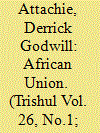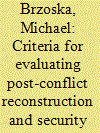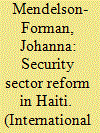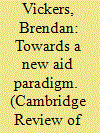| Srl | Item |
| 1 |
ID:
131222


|
|
|
| 2 |
ID:
068204


|
|
|
| 3 |
ID:
119717


|
|
|
|
|
| Publication |
2013.
|
| Summary/Abstract |
Local communities such as villages are commonly assumed to be vital partners in counterinsurgency and post-conflict reconstruction. However, the success of all policies based on this assumption depends on the level of social cohesion at the community level: communities with internal cleavages and fissures will be less effective in making external efforts a success. In this article, we study how exposure to violence during civil war affects the internal cohesion of a community. On the one hand, we could assume that exposure to a common threat strengthens social ties. On the other hand, shifting power structures in conflict regions could introduce new loyalties and cleavages at the village level, thus eroding a community's social glue. We use data from a survey conducted in northern Afghanistan and combine it with the data on violent events from military records. Our results provide evidence for the second mechanism: exposure to violence causes villagers to diverge in their support for conflicting parties. We estimate a spatial-temporal gravity model, where spatially and temporally proximate events have the highest impact on this divergence at the village level.
|
|
|
|
|
|
|
|
|
|
|
|
|
|
|
|
| 4 |
ID:
068205


|
|
|
| 5 |
ID:
068210


|
|
|
| 6 |
ID:
118658


|
|
|
|
|
| Publication |
2012.
|
| Summary/Abstract |
As the largest African economy and the leading African aid-provider, with plans to establish an aid agency, South Africa is often ranked among the developing world's 'emerging donors'. However, the country's development cooperation commitments are smaller in scope, scale and ambition than the aid regimes of the BRIC (Brazil, Russia, India, China) or Gulf state donors. Given its limited resources and domestic socioeconomic challenges, South Africa prefers the role of 'development partner'. In this role, South Africa's development cooperation in Africa has ranged from peacekeeping, electoral reform and post-conflict reconstruction to support for strengthening regional and continental institutions, implementing the New Partnership for Africa's Development (NEPAD) and improving bilateral political and economic relations through dialogue and cooperation. This article seeks to determine whether Pretoria's development cooperation offers an alternative perspective to the aid policies and practices of the traditional and large rising donors. We conclude that South Africa does not fit neatly the 'donor' category of the Organization for Economic Cooperation and Development's (OECD's) Development Assistance Committee (DAC) and neither is Pretoria's aid-spending typically 'ODA' (official development assistance). Instead, with its new aid agency, South Africa occupies a unique space in Africa's development cooperation landscape. With fewer aid resources, but a 'comparative advantage' in understanding Africa's security/governance/development nexus, South Africa can play an instrumental role in facilitating trilateral partnerships, especially in Southern Africa.
|
|
|
|
|
|
|
|
|
|
|
|
|
|
|
|